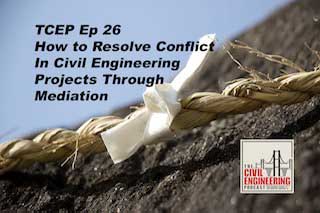Podcast – Does Mediation solve Civil Engineering and Construction disputes?
Chris Knutson, P.E. of the Engineering Career Coach questioned me: Does Mediation solve civil engineering and construction disputes? While he was in Stuttgart, Germany and I in California we tackled that question and more. With over 750,000 downloads under their belt, I was honored to answer their questions.
Here’s the links to the podcast.
Here are more detailed answers to some of their questions:
From your experience, how successful is mediation for resolving civil engineering and construction disputes? What happens if a mediation doesn’t produce an agreed upon resolution?
I’m a little bias in my response. I find mediation to be very successful in resolving disputes.
If the mediation does not create a settlement that is satisfactory to all of the key decision makers, it has reached an impasse. At that point, we might try to create a partial agreement. If not a partial agreement, we might schedule another mediation session. I will do follow up to see if the parties can come to an agreement or schedule another session. I am finding that it is common to have several sessions particular in complex cases. Without an agreement, it is as if the mediation never took place. The parties are free to seek other solutions to the dispute.
What does a mediation look like…who’s involved…what might one expect as it unfolds? (In other words, who hears the mediation, who is typically involved, how long do they typically last)
First of all, the mediator is not a judge. All of the stakeholders/decisions makers need to hear all sides off the dispute and solve it on their own terms The mediator is there to facilitate the process.
The mediation really starts with the first contact to the mediator. There may be multiple conversations jointly or separately with the mediator before the mediation session. This period of time also includes a mediation brief outlining each party’s description of the dispute, plus their goals and needs.
On the day of the mediation, I usually begin with a group session where I outline the process that we will engage in during the day. We also start with introductions of the parties and a statement of their opinion of why we are in a dispute. We also start to develop a complete list of issues that need to be resolved.
At some point, we will break out in separate rooms so that I can have private conversations with each party. This will continue until we develop a settlement agreement.Less complicated issues can take a day or less. The bigger the project and the more stakeholders involved will lengthen the time to reach an agreement. It might be several days.
What are some of the qualifications a good mediator?
• Able to quickly build trust and confidence.
• Excellent inter-personal skills: Patience and a sense of humor.
• Creativity in assisting parties and counsel in shaping a solution.
• Willing to do everything they can to encourage and assist in settlement.
• Being prepared for your mediation.
How does a mediation start? Does it have to be included in a contract to be a method of conflict resolution, or can both parties agree to follow it versus litigation or arbitration?
Mediation can be done at any point in the dispute.
• It can be pre-litigation. In other words, no lawsuit has been filed. If there is a dispute resolution board put into place, it will happen throughout the project as needed.
• Mediation can run parallel to litigation and arbitration. And can even be done post judgment.
• It does not have to be part of the contract. If it is part of the contract, the contract should spell out how mediation is started.
• If the contact specifies a specific provider that is not necessarily final. If the parties agree, you can use another provider such as myself.
 About the Author: Ken Strongman (www.kpstrongman.com) has years of experience and a growing national reputation as a mediator and arbitrator. He has successfully resolved more than a thousand disputes in the fields of construction defects, real estate, intellectual property, and employment. He is also a Mediator and Arbitrator for FINRA.
About the Author: Ken Strongman (www.kpstrongman.com) has years of experience and a growing national reputation as a mediator and arbitrator. He has successfully resolved more than a thousand disputes in the fields of construction defects, real estate, intellectual property, and employment. He is also a Mediator and Arbitrator for FINRA.
© 2020 Ken Strongman. All Rights Reserved. Please do not copy or repost without permission.
